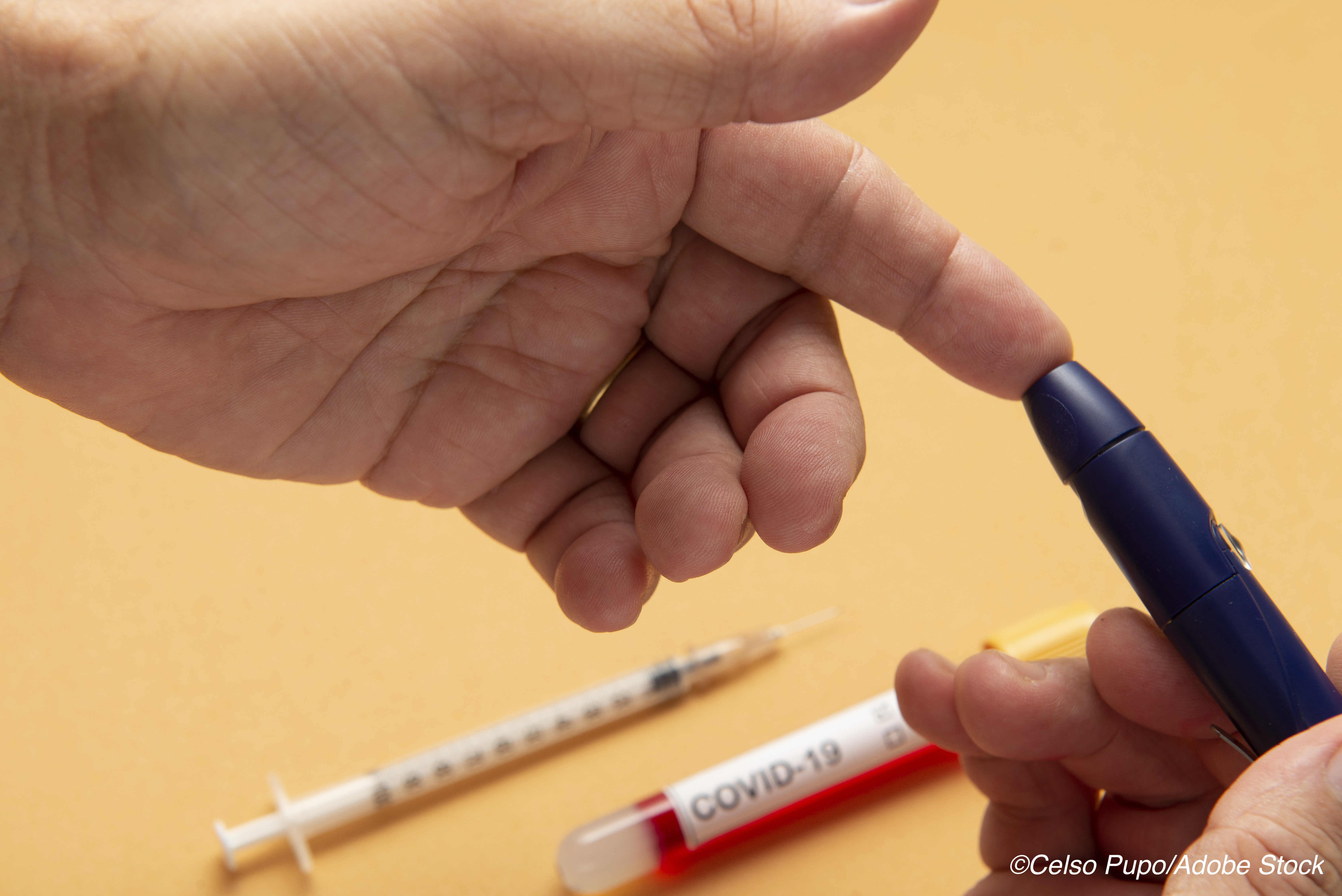
Finger-stick point-of-care testing for Covid-19 antibodies using lateral flow assays (LFA) proved to be highly effective for identifying prior infections in a prospective study involving people who had experienced a mostly mild disease course.
Nearly all patients with a positive Covid-19 polymerase chain reaction (PCR) test had detectable antibodies, with point-of-care serology testing showing 93% to 97% sensitivity. Sensitivity and specificity were not significantly different with blood and serum samples.
The researchers concluded that the study findings, published in the journal PLOS One, suggest point-of-care antibody testing is a useful screen for prior Covid-19 infection, which should be considered for the assessment of vaccine response.
“The tests evaluated herein correlate well with higher complexity serum antibody assays, require less infrastructure, and can be performed in point-of-care setting without a venous blood draw,” wrote researcher Charles Schuler IV, MD, of the University of Michigan Division of Allergy and Clinical Immunology, and colleagues. “This could allow lateral flow assays to provide accurate antibody results in primary care and point-of-care situations and assist in prioritizing individuals receiving Covid-19 vaccines. Such a ’screen before vaccine’ approach might be helpful in prioritizing vaccines in the general population, where those who produce a positive point-of-care test could conceivably wait for vaccination.”
The researchers noted that unlike PCR testing, which is positive during acute infection, serologic testing identifies antibody responses to prior infection.
They wrote that while antibody assays have been useful for prevalence determinations, “fuller validation of serologic testing to detect Covid-19 infection is still needed.”
Current assays use different SARS-CoV-2 detection antigens and have different testing conditions. Some assays identify both virus-specific immunoglobulin G (IgG) and immunoglobulin M (IgM), while others only identify IgG.
“CLIA laboratory-based antibody assays are expensive, require blood draws for serum, and need sample transport to a CLIA-approved facility. Rapid antibody tests using LFA solve these logistical problems but have had other issues,” Schuler and colleagues wrote. “While initially loosely regulated their function has now been verified by a standardized EUA in the U.S. requiring a prior FDA technical review. Despite this, the accuracy of these assays has continued to be questioned, and no test is currently approved for finger-stick point-of-care use. “
Their study was designed to provide real-world use data on the efficacy at point-of-care settings for three LFA tests: Access Bio’s CareStart, Autobio Diagnostics’ Autobio, and Healgen Scientific’s test Healgen. All three tests were granted emergency use authorization (EUA) as rapid tests for Covid-19 by the FDA, but agency officials revoked the EUA for Autobio last August citing newly available testing showing poor performance in the detection of SARS-CoV-2 antibodies.
The prospective study included 512 enrolled participants, including 104 with a documented Covid-19 history and positive PCR. Just three of the PCR-positive participants required hospitalization related to Covid-19, and one of these patients required mechanical ventilation. Ninety-three participants had a known negative PCR test within 14 days of enrollment, and the remainder had no history of PCR testing for Covid-19. The median age of the participants was 39 years, 75% were female, and 88% were healthcare workers.
Among the PCR-positive participants, symptoms included fever >38˚C (53%), subjective fever (77%), chills (79%), myalgias (82%), headache (75%), diarrhea (58%), anosmia (70%), dysgeusia (64%), rhinorrhea (47%), sore throat (52%), cough (77%), dyspnea (56%), nausea and/or vomiting (35%), and abdominal pain (30%).
The performance of the three LFA tests using serum compared to PCR and immunoassay was:
- CareStart showed 96.2% sensitivity and 89.2% specificity with PCR and 98.3%/94.0% sensitivity/specificity with the immunoassay.
- Healgen showed 95.2%/88.2% sensitivity/specificity with PCR and 96.5%/94.2% sensitivity/specificity with the immunoassay.
- Autobio showed 87.8%/84.6% sensitivity/specificity with PCR and 93.2%/96.1% sensitivity/specificity with the immunoassay over 149 participants tested prior to EUA revocation.
The three tests showed slightly better sensitivity/specificity results for IgG than IgM positivity.
Schuler and colleagues noted that the CareStart and Healgen assays showed good agreement with the immunoassay in serum-based and finger-stick blood testing.
“This suggests that in this partially unselected population, use of an LFA can detect prior unknown Covid-19 infection to a degree similar to a high-moderate complexity immunoassay,” the researchers wrote.
They added that the reasons for the better performance of the two assays in identifying prior Covid-19 infection are multiple.
“We used assays that were fully vetted by the FDA before EUA approval,” they wrote. “The Autobio assay we examined that had the EUA revoked had less sensitivity compared to the other tests. In addition, all the tests we employed used spike protein as the primary antigen… and it has been suggested that nucleocapside assays have less sensitivity.”
“These data suggest that regulatory agencies are now appropriately approving these tests but may not indicate that all LFA assays are accurate when using finger -stick blood,” the researchers wadded.
They concluded that in addition to prioritizing vaccine use in the general population, the tests might prove useful for assessing antibody response to Covid-19 vaccines.
-
Finger-stick point-of-care testing for Covid-19 antibodies using lateral flow assays (LFA) proved to be highly effective for identifying prior infections in a prospective study involving people who had experienced a mostly mild disease course.
-
The study findings suggest that point-of-care antibody testing is a useful screen for prior Covid-19 infection, which should be considered for the assessment of vaccine response, the researchers concluded.
Salynn Boyles, Contributing Writer, BreakingMED™
This research was funded by the University of Michigan, the National Institutes of Health, Healgen Scientific and Access Bio Inc.
Schuler reported salary and other support from the Mary H. Weiser Food Allergy Center and the Taubman Innovation Institute at the University of Michigan.
Cat ID: 190
Topic ID: 79,190,570,730,933,190,926,192,927,925,934


